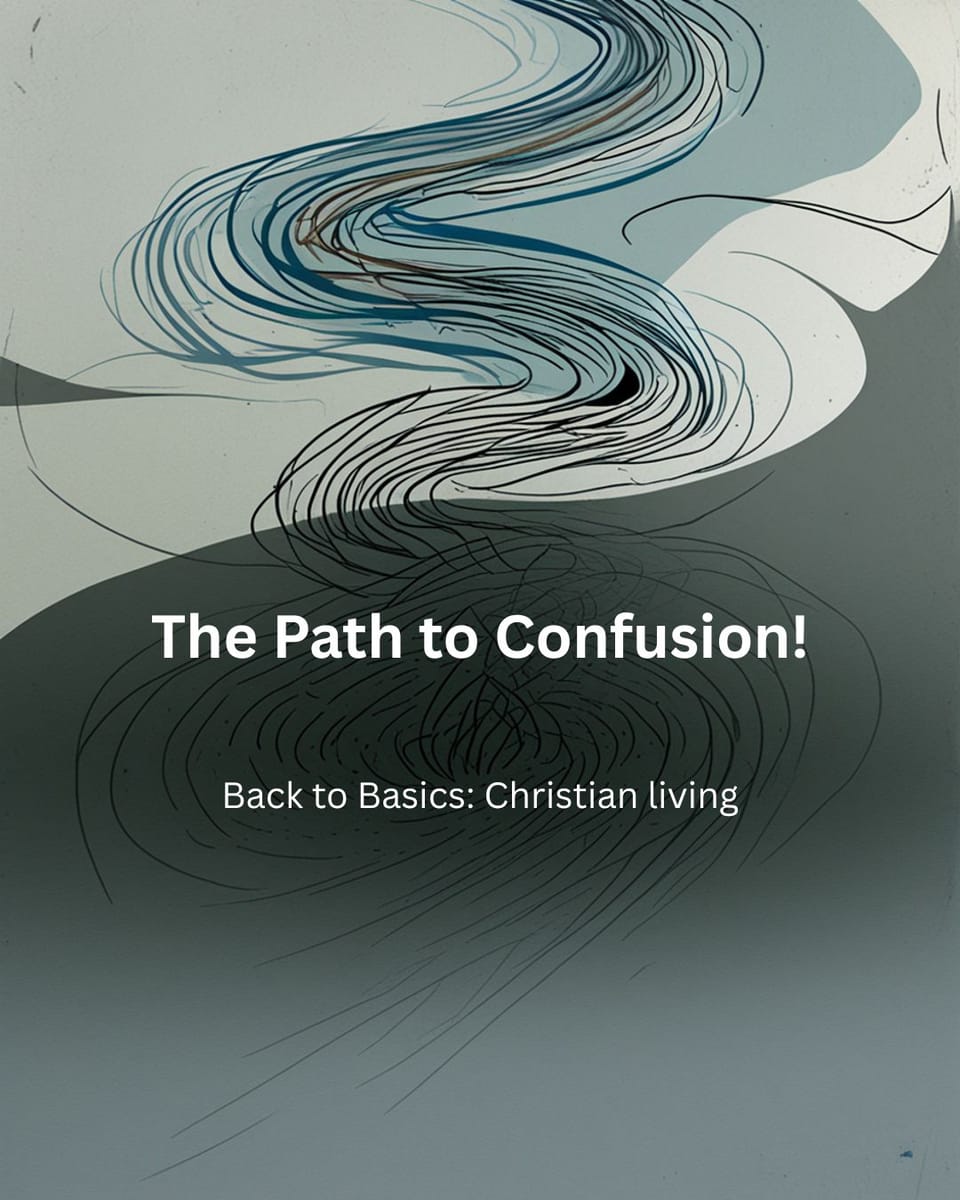The Path to Confusion!

The Deception of False Knowledge
In today's Christian landscape, we are witnessing a troubling phenomenon: the rise of what I call "intellectual Christianity" - a faith that prioritises theological knowledge over practical obedience. Many believers have become so engrossed in doctrinal debates, theological nuances, and intellectual pursuits that they've lost sight of the simplicity that lies at the heart of our faith.
The Apostle Paul expressed concern about this very issue when writing to the Corinthians: "But I fear, lest by any means, as the serpent beguiled Eve through his subtilty, so your minds should be corrupted from the simplicity that is in Christ." (2 Corinthians 11:3 KJV)
This warning rings true today as many Christians wander down the path to confusion, becoming "ever learning, and never able to come to the knowledge of the truth." (2 Timothy 3:7 KJV)
Knowledge Without Obedience
The fundamental problem with intellectual Christianity is not the pursuit of knowledge itself, but rather knowledge divorced from obedience. Jesus made this distinction clear when He said, "Not everyone that saith unto me, Lord, Lord, shall enter into the kingdom of heaven; but he that doeth the will of my Father which is in heaven." (Matthew 7:21 KJV)
James echoes this sentiment powerfully: "But be ye doers of the word, and not hearers only, deceiving your own selves." (James 1:22 KJV) There is a self-deception that occurs when we accumulate biblical knowledge without putting it into practice. We begin to believe that knowing equates to spiritual growth, when in reality, it's the application that transforms us.
The Pharisees of Jesus' day epitomised this problem. They possessed extraordinary knowledge of Scripture but missed its heart entirely. Jesus rebuked them saying, "Search the scriptures; for in them ye think ye have eternal life: and they are they which testify of me. And ye will not come to me, that ye might have life." (John 5:39-40 KJV)
The Tangled Web of Theological Debates
Many intellectual Christians today find themselves entangled in endless theological controversies that, while perhaps academically stimulating, rarely produce spiritual fruit. Paul warned Timothy about this tendency: "But foolish and unlearned questions avoid, knowing that they do gender strifes." (2 Timothy 2:23 KJV)
Instead of pursuing love, unity, and the practical application of faith, these believers spend countless hours debating peripheral issues, dissecting doctrinal positions, and creating divisions within the Body of Christ. This stands in stark contrast to Paul's exhortation: "Let all your things be done with charity." (1 Corinthians 16:14 KJV)
These endless debates and arguments often lead to spiritual pride - a particularly dangerous state where one's theological knowledge becomes a source of superiority rather than humility. "Knowledge puffeth up, but charity edifieth." (1 Corinthians 8:1 KJV)
Criticism Without Construction
Perhaps one of the most troubling manifestations of intellectual Christianity is the tendency to spend more time criticising other believers than edifying the Body of Christ. Social media platforms are rife with Christians railing against particular churches, leaders, or theological perspectives, often with little grace or constructive intent.
The Bible cautions us against this behaviour: "Let no corrupt communication proceed out of your mouth, but that which is good to the use of edifying, that it may minister grace unto the hearers." (Ephesians 4:29 KJV)
Too many believers have become experts at pointing out the perceived errors of others while neglecting to examine their own spiritual condition. Jesus addressed this clearly: "And why beholdest thou the mote that is in thy brother's eye, but considerest not the beam that is in thine own eye?" (Matthew 7:3 KJV)
The Simplicity of Christ
The antidote to this confusion is returning to what Paul calls "the simplicity that is in Christ." This doesn't mean abandoning theological study but rather ensuring that our knowledge leads to transformation and obedience.
Jesus simplified the entirety of God's law into two commands: "Thou shalt love the Lord thy God with all thy heart, and with all thy soul, and with all thy mind. This is the first and great commandment. And the second is like unto it, thou shalt love thy neighbour as thyself." (Matthew 22:37-39 KJV)
These two commandments - love God and love others - form the foundation of authentic Christian living. When our theological pursuits enhance our ability to fulfil these commands, they serve their proper purpose. When they distract from these core principles, they lead us down the path to confusion.
The Evidence of the Holy Spirit
True spiritual maturity isn't measured by the depth of one's theological knowledge but by the fruit of the Spirit evident in one's life: "But the fruit of the Spirit is love, joy, peace, longsuffering, gentleness, goodness, faith, Meekness, temperance: against such there is no law." (Galatians 5:22-23 KJV)
Those truly filled with the Holy Spirit will exhibit these qualities, not endless criticism and theological hairsplitting. The absence of this fruit should cause us to question whether we've strayed from authentic Christianity into a mere intellectual exercise.
Jesus said we would know His disciples by their love for one another (John 13:35 KJV), not by their ability to win theological arguments or point out the errors of others.
Finding Our Purpose in the Body of Christ
Many intellectual Christians have lost sight of their purpose within the Church. Rather than using their gifts to build up the Body of Christ, they've become critics standing on the side lines. Paul reminds us that every believer has a vital role to play: "From whom the whole body fitly joined together and compacted by that which every joint supplieth, according to the effectual working in the measure of every part, maketh increase of the body unto the edifying of itself in love." (Ephesians 4:16 KJV)
The Way Forward
How do we avoid this path to confusion? The answer lies in maintaining the proper balance between knowledge and application, between understanding and obedience.
- Prioritise obedience over mere knowledge: "But whoso keepeth his word, in him verily is the love of God perfected: hereby know we that we are in him." (1 John 2:5 KJV)
- Cultivate humility in your learning: "Let this mind be in you, which was also in Christ Jesus: Who... made himself of no reputation and took upon him the form of a servant." (Philippians 2:5-7 KJV)
- Focus on the essentials of faith: "Till we all come in the unity of the faith, and of the knowledge of the Son of God, unto a perfect man, unto the measure of the stature of the fulness of Christ." (Ephesians 4:13 KJV)
- Let love guide your interactions: "And above all things have fervent charity among yourselves: for charity shall cover the multitude of sins." (1 Peter 4:8 KJV)
- Seek to build up, not tear down: "Let us therefore follow after the things which make for peace, and things wherewith one may edify another." (Romans 14:19 KJV)
The path to confusion is paved with knowledge without obedience, criticism without love, and complexity without simplicity. Jesus calls us back to a faith that transforms not just our minds but our hearts and actions. As we pursue deeper knowledge of God's Word, let us ensure it leads us to greater obedience, more fervent love, and the simplicity that is found in Christ.
For at the end of the day, "Though I speak with the tongues of men and of angels, and have not charity, I am become as sounding brass, or a tinkling cymbal. And though I have the gift of prophecy, and understand all mysteries, and all knowledge; and though I have all faith, so that I could remove mountains, and have not charity, I am nothing." (1 Corinthians 13:1-2 KJV).
Key Takeaways:
- Return to the simplicity that is in Christ - Don't let theological complexity corrupt the straightforward message of loving God and loving others
- Knowledge without obedience is self-deception - Being a doer of the Word, not merely a hearer, is what brings true spiritual transformation
- Avoid foolish debates that generate strife - Endless theological arguments rarely produce spiritual fruit and often lead to division
- Let love guide all interactions - Knowledge puffs up, but love builds up the Body of Christ
- Focus on producing the fruit of the Spirit - True spiritual maturity is evidenced by love, joy, peace, and the other fruits, not by winning theological arguments
- Examine yourself before criticising others - Remove the beam from your own eye before pointing out the speck in your brother's eye
- Use your gifts to build up, not tear down - Every believer has a role in edifying the Body of Christ in love





